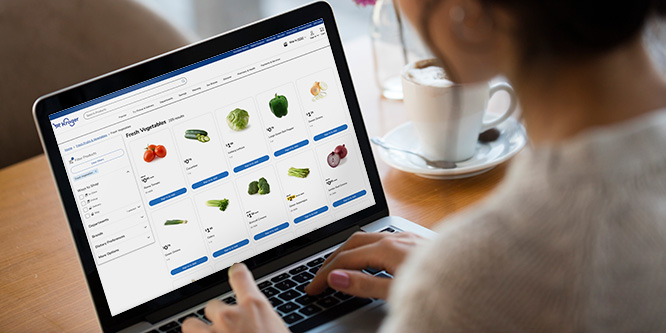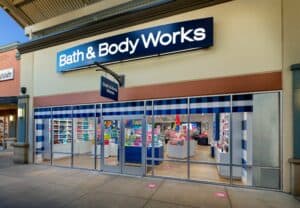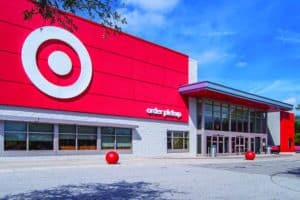
Source: kroger.com
December 2, 2022
Is Kroger lagging in e-commerce?
Jinjoo Lee, Heard on the Street columnist at The Wall Street Journal, has found some “nits to pick” with Kroger following the grocery giant’s release of its third quarter earnings results and its recent deal, pending regulatory approval, to merge with Albertsons.
Ms. Lee writes that Kroger’s 6.9 percent gain in same-store sales, excluding gas, is positive but its growth trails peers including Ahold Delhaize, which posted an 8.2 percent gain. Kroger rivals Walmart and Target each saw grocery comps grow above 10 percent in their latest reports.
Particularly concerning for Ms. Lee is what she perceives as a lack of progress by Kroger on the digital front. She points to the most recent quarter when Kroger’s 10 percent growth in online sales fell behind Walmart’s 16 percent gain. The columnist further cites an Insider Intelligence forecast that projects Kroger losing online grocery market share this year followed by two years where it remains “stagnant.”
Kroger’s current performance and the forecasts help to strengthen the company’s argument for completing the Albertsons deal, writes Ms. Lee.
Rodney McMullen, Kroger CEO, speaking earlier this week before the Senate Committee on the Judiciary, Subcommittee on Antitrust, Competition Policy and Consumer Rights, said that the merger would not change the balance of power within grocery where Walmart is at the top.
Kroger and Albertsons’ rationale for approval of the merger is that grocery is not solely about supermarkets, given the wide range of competitors (Walmart, Costco, Amazon.com) operating formats that do not fall under the traditional label.
Dealing with a wide variety of rivals has required Kroger to adapt its business model. Mr. McMullen spoke to the retailer’s digital development.
“Our digital investments are focused on growing our Kroger Delivery network,” said Mr. McMullen. “This includes Kroger Delivery Now with Instacart, which established Kroger as the first grocery retailer to directly provide a convenience delivery solution, with deliveries made in as little as 30-minutes. It also includes our collaboration with technology firm Ocado Group to build out e- commerce customer fulfillment centers.”
Kroger is looking to grow its digital channel sales to $10 billion by the end of 2023. A merger with Albertsons, while requiring investments, opens up opportunities for growth.
“Kroger can make use of Albertsons’ locations to drive click-and-collect growth, while Albertsons can leverage Kroger’s fulfillment infrastructure to bring its online capabilities in-house, instead of relying on third-parties like Instacart and DoorDash,” Insider Intelligence senior analyst Blake Droesch told Retailwire in an October email.
Discussion Questions
DISCUSSION QUESTIONS: How do Kroger’s digital operations stand up to its competitors in the grocery space? Would a merger with Albertsons be a boost or a drag on Kroger’s online expectations?
Poll
BrainTrust
Neil Saunders
Managing Director, GlobalData
Ananda Chakravarty
Vice President, Research at IDC
David Spear
President, Retail, OrderlyMeds
Recent Discussions








Some of this analysis is very superficial. Yes, Kroger’s latest 10 percent growth rate in e-commerce is below that of Walmart. However Kroger’s digital sales grew much faster in the pandemic. Here are the Q3 digital growth rates on a three year basis compared to the same period in 2019:
Kroger: +123.3 percent
Walmart: +116.9 percent
Over that period, Kroger has not lost market share in online grocery. It has gained share. Albertsons has grown faster, but it has come from a much lower base so, to some extent, is playing catch-up.
There are certainly more things Kroger needs to do in the digital space, but it isn’t a laggard: it has actually been one of the more innovative and experimental players.
Excellent data points Neil. I agree, Kroger is not a laggard in the online grocery space and they continue to test new innovative technologies and processes.
Albertsons has steadily been running $40 off $75 online pickup and also free delivery with digital coupons for the past year. Their pick up and delivery program gets very little traffic compared to Kroger. Their prices are significantly higher and that pricing has been a big problem trying to build an online business.
“Ms. Lee writes that Kroger’s 6.9 percent gain in same-store sales, excluding gas, is positive.” Really? Undoubtedly not positive in an era of over 10 percent grocery inflation.
Regarding digital operations, it is clear that Kroger has siloed digital. Should they be developing their service rather than tying it in with Instacart? I don’t think Instacart is a bad idea. It may be the only idea. It would take a massive effort to surpass Walmart or Amazon, even with Kroger (or Albertsons).
They should focus on the digital basics and delivery in a reasonable time frame. Treat BOPIS as an everyday routine.
By the way, is BOPIS revenue considered store revenue or online revenue?
You know, that’s an interesting question. You wouldn’t notice it in a market where it was familiar to you, I don’t think — but they came to Miami with delivery first. The biggest draw is (yes, I know it sounds stupid, but it’s right) refrigerated trucks.
I’m looking for an alternative to Publix, so I gave their app three different tries. Too much private label that I know nothing about, not so easy to find what I was looking for — I couldn’t quite put my finger on it and, when I finally built the order, they gave me a two-day lead time. I canceled.
Overall, something is not right. With all due respect to Neil, I don’t think its sales growth during the pandemic is so relevant to its long-term prospects. Something isn’t right.
I think looking at the past performance is relevant. If a retailer grew rapidly over a period – which was not just because of the pandemic but because of their strategies – then that needs to be factored in when looking at current growth. On top of this, Walmart’s digital numbers also include non-food which has been a big area of growth over the past few years, so it’s not comparing like with like when Kroger’s figures are mostly grocery. I am not defending Kroger, per se, as I think there is a lot more they can do on digital. However I find some of the analysis in the article a bit superficial…
Living in New Jersey I don’t have first hand experience with Kroger’s digital operations, but from a strategic perspective this merger will be interesting. Albertsons will almost double Kroger’s store footprint and give them more stores in the U.S. than Walmart. If executed well, this will let them achieve economies of scale that were previously unavailable, and reach more customers with their 30-minute offering. But they’ll need to have a strong plan for rolling this out successfully across their digital and fulfillment operations. The “how” of their strategy will be critical.
I’ve always felt Walmart, Amazon and Publix have better digital capabilities than Kroger, but this certainly could change with the pending merger. The key will be to leverage the best tech in both companies’ stack to come away with a stronger, more capability-rich digital experience. But this is a tall task. History reminds us that mega-mergers like this take years for tech stacks to be integrated and, more often than not, consumer’s walk away with little advantage.
Krogers Ocado investment offers tremendous advantages in delivery speed, accuracy and in the long run, cost savings. This game is a marathon, not a sprint and Kroger is moving and investing correctly. The merger with Albertsons drives overall business substantially, and moves the organization much closer to Walmart’s online grocery dominance, but Walmart continues to maintain market share. Absolute $ might be only metric to compare two very different grown up organizations.
Their digital system is not good. They are no Amazon. The website is so cumbersome and slow. I find Walmart to also be rather cumbersome though, at present.
But out in Kroger territory, they are very effective on their pick up service. Many customers are using that website or app and placing orders. I never have.
The private label program is very strong. It is the best in the industry.
I don’t know that these questions should be seen as related: my concern about the Albertsons merger is that the latter was poorly run and/or the stores might otherwise be a poor fit.
As for the online, I don’t find arguments based on single two-point comparisons — i.e. this month/this year vs. this month/last year — to be very meaningful; if Kroger has half the gain of competitors for a decade, that’s another matter.
The Kroger Feedback Survey is a platform for customers to share their shopping experiences and contribute to improving services. By visiting https://kroger-feedback.page/ and entering receipt details, shoppers can provide insights on critical areas such as product availability and customer service. Completing the survey also offers the opportunity to win rewards, making it a beneficial experience for customers. This process allows individuals to make their voices heard and enhance overall shopping experiences.